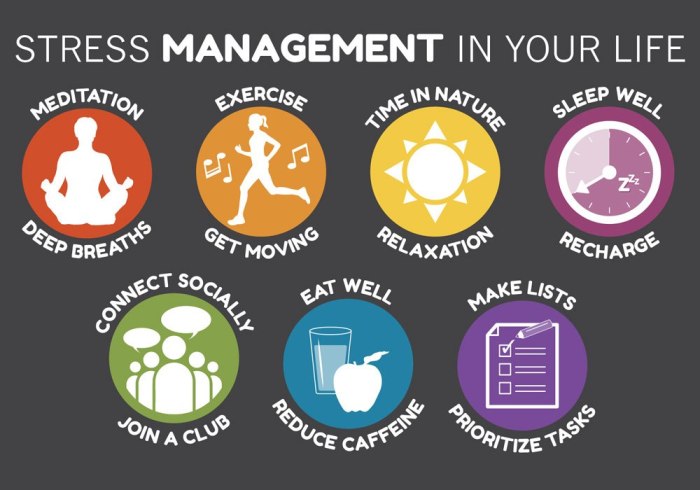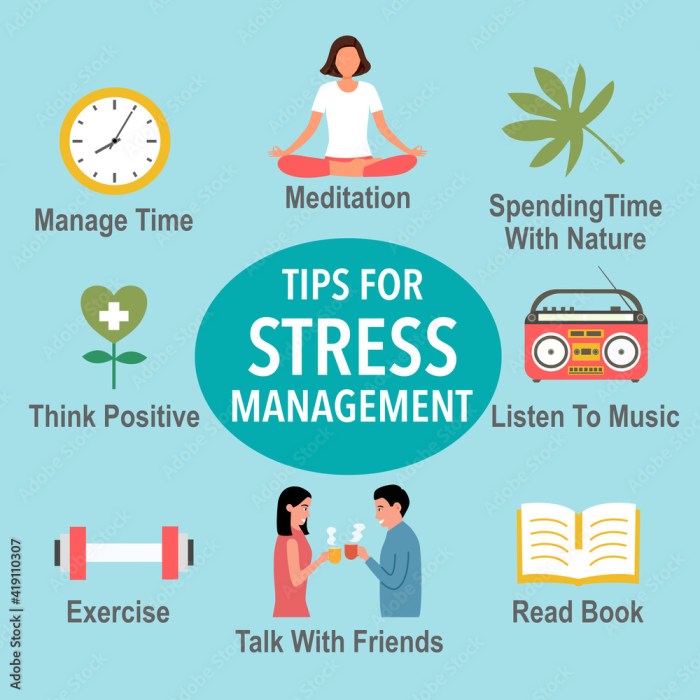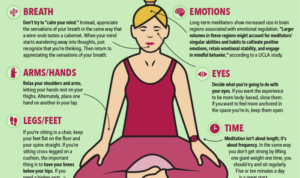Stress Management Tips: Keep Calm and Stay Balanced for Success dives deep into the art of handling stress like a pro, with techniques that are as cool as your favorite high school playlist. From boosting productivity to nurturing relationships, this guide has got you covered.
Whether you’re into mindfulness or prefer breaking a sweat, this guide will show you the way to a stress-free life. Get ready to conquer stress and unlock your full potential with these tips and tricks.
Importance of Stress Management: Stress Management Tips
Stress management is like the MVP of the game when it comes to your well-being, fam. It’s all about keeping your mind and body in check so you can stay winning in life. Let’s break it down.
When you let stress run wild without a leash, it can mess you up big time, both physically and mentally. Your body starts acting like it’s in a constant state of emergency, which ain’t cool. This can lead to all sorts of health issues like high blood pressure, weakened immune system, and even anxiety or depression. Ain’t nobody got time for that, right?
But when you handle stress like a boss, you’re not only taking care of yourself, but you’re also leveling up your game in other areas. Effective stress management can boost your productivity at school or work, helping you get that A+ or that promotion. Plus, it can improve your relationships with others ’cause you’re not snapping at everyone like a hungry bear. So, remember, managing stress isn’t just a nice-to-have, it’s a need-to-have for a successful and fulfilling life.
Strategies for Stress Reduction
When it comes to managing stress, there are various techniques that can help individuals cope with the pressures of daily life. By incorporating strategies such as deep breathing, mindfulness, and exercise into their routine, individuals can effectively reduce stress levels and improve their overall well-being.
Deep Breathing
- Deep breathing exercises involve taking slow, deep breaths to help calm the nervous system and reduce anxiety.
- Benefits of deep breathing include lowering heart rate, reducing blood pressure, and promoting relaxation.
- Real-life example: Sarah, a busy professional, practices deep breathing exercises before presentations to help manage her nerves and stay focused.
Mindfulness
- Mindfulness involves being fully present in the moment and paying attention to thoughts and feelings without judgment.
- Benefits of mindfulness include increased self-awareness, improved focus, and better stress management.
- Real-life example: John, a college student, practices mindfulness meditation daily to help him stay calm and focused during exams.
Exercise
- Regular physical activity, such as walking, running, or yoga, can help reduce stress hormones and improve mood.
- Benefits of exercise include boosting endorphins, enhancing sleep quality, and reducing symptoms of anxiety and depression.
- Real-life example: Maria, a working mom, incorporates daily workouts into her schedule to relieve stress and boost her energy levels.
Work-Life Balance Tips

Finding the right balance between work and personal life is crucial for managing stress effectively. When we prioritize our well-being and make time for activities outside of work, we can reduce stress levels and improve overall happiness.
Set Boundaries
- Establish clear boundaries between work and personal time.
- Avoid checking work emails or taking calls during personal time.
- Learn to say no to additional work tasks if your plate is already full.
Make Time for Self-Care
- Engage in activities that you enjoy and that help you relax.
- Exercise regularly to boost your mood and reduce stress.
- Practice mindfulness or meditation to calm the mind and reduce anxiety.
Prioritize Tasks
- Create a to-do list and prioritize tasks based on importance and deadlines.
- Avoid multitasking and focus on completing one task at a time.
- Delegate tasks when possible to avoid feeling overwhelmed.
Stay Connected, Stress Management Tips
- Build and maintain strong relationships with friends and family.
- Make time for social activities and connect with others regularly.
- Seek support from loved ones when feeling stressed or overwhelmed.
Healthy Habits for Stress Management

Stress is a common part of life, but it’s important to find healthy ways to manage it. Incorporating certain habits into your daily routine can help you effectively reduce stress and improve your overall well-being.
The Role of Nutrition in Stress Management
Eating a well-balanced diet is essential for managing stress. Foods rich in vitamins, minerals, and antioxidants can help regulate your mood and reduce stress levels. Make sure to include plenty of fruits, vegetables, whole grains, and lean proteins in your meals. Avoid excessive caffeine, sugar, and processed foods, as they can increase feelings of anxiety and stress.
The Role of Exercise in Stress Management
Regular physical activity is a great way to reduce stress and improve your mental health. Exercise releases endorphins, which are natural mood lifters, and helps you relax and clear your mind. Aim for at least 30 minutes of moderate exercise most days of the week, whether it’s walking, running, yoga, or dancing. Find an activity you enjoy to make it easier to stick to a routine.
The Role of Sleep in Stress Management
Getting enough quality sleep is crucial for managing stress. Lack of sleep can make you more irritable, anxious, and unable to cope with daily challenges. Establish a regular sleep schedule, create a relaxing bedtime routine, and make your bedroom a comfortable and peaceful environment. Aim for 7-9 hours of sleep per night to feel refreshed and ready to face the day.
Tips for Incorporating Healthy Habits Into Your Daily Routine
– Start your day with a nutritious breakfast to fuel your body and mind.
– Schedule regular exercise sessions throughout the week to reduce stress.
– Practice mindfulness or meditation to help calm your thoughts and relax your body.
– Stay hydrated by drinking plenty of water throughout the day.
– Prioritize self-care activities that bring you joy and relaxation.
– Set boundaries to protect your time and energy from stressors.
– Seek support from friends, family, or a counselor when needed.
Remember, incorporating healthy habits into your daily routine takes time and effort, but the long-term benefits for managing stress and improving your overall well-being are well worth it.

